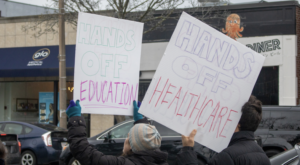Dina Haynes, professor of law at the New England School of Law, gave a lecture on Friday entitled “Retaliation Nation: How government action aimed at restricting immigration intrudes on foundational democratic principles.” Her appearance was a part of the Center for Human Rights and International Justice’s Rights in Conflict luncheon discussion series.
Haynes began by explaining the topic’s impact and importance, before explaining and analyzing several recent events that highlight a dramatic shift in immigration enforcement agents’ behavior following new executive orders and initiatives by President Donald Trump and Attorney General Jeff Sessions.
Haynes first noted that the United States Citizenship and Immigration Services removed “nation of immigrants” from its masthead, suggesting a normalization of nativism, which she believes is a precursor to genocide and ethnic cleansing.
With this in mind, Haynes stressed the importance of not remaining silent, calling it “the greatest threat to democracy.” She then went into more detail about specific shifts in action by immigration enforcement agents, specifically those undertaken by departments that answer to the Executive Branch.
First, she talked about U.S. Customs and Border Protection (CBP), which is responsible for enforcing immigration laws at the borders. She noted that they were taking excessive, inhumane action that was not called for by Trump’s Executive Order 13769, rattling off many examples of young children or infants being separated from their parents for long hours.
“These are just human beings with jobs … who are not required to do those things to carry out the refugee ban, but decided to,” Haynes said. “It’s … troubling to those in immigration law. We detain a lot of people in the United States who have committed no crime—and when they’re detained, they’re handcuffed and shackled, wear prison jumpsuits, having committed no crime.”
Haynes also noted that the CBP was stepping up its stop and search practices. She argued that the its ability to search without a warrant within 100 miles of the U.S. border increases cases of racial profiling, positing with certainty that CBP agents are more likely to assume minority individuals to be non-citizens.
Next, Haynes pointed to Immigration and Customs Enforcement (ICE), saying its dramatically increased commitment to finding and deporting illegal immigrants and gang members infringes on our rights protected in the 4th Amendment, triggering fear in many both for themselves and their loved ones. Haynes found the fact that ICE agents were going to places they once did not go to and speaking to children about their parents to be especially troubling.
“What ICE is doing is … to just cast the net as wide as they can to get information from children about their own family members,” she said. “Schools, hospitals, USCIS offices, churches—they all used to be considered sensitive locations where ICE wasn’t showing up to seek this kind of information.”
A clear issue driving these changes was the fact that not much about what is and is not allowed is dictated in the rules.
“All of the branches of DHS have broad discretion,” Haynes said. “And we’ve just come to realize … that we have a lot of grey areas in the law and the Constitution, a lot of which we ignored because people just didn’t cross those lines: We operated on a certain level of values that we all agreed on … without realizing it … All of these things we’ve counted on for hundreds of years—there aren’t any laws saying they need to be done.”
Whatever the causes may be, Haynes emphasized the importance of dealing with these issues as quickly as possible, as the fear triggered by these new practices—such as indicating immigration status on the census—prevents all citizens from going out to exercise their civic duties, like voting. Ultimately, she believes that this causes a democratic deficit, which is an “insufficient level of democracy in political institutions and procedures in comparison with a theoretical ideal of a democratic government.”
“In a lot of communities, like Newton, you have to fill out the census information in order to be registered [to vote],” Haynes said. “So if they avoid census-takers, even U.S. citizens become deregistered. That’s a real problem for our democracy.”
While Haynes listed some probable causes of this democratic deficit, she never pointed to a definite cause of immigration agents’ changing practices. Nevertheless, she believed it was clear that the agents’ behaviors must be understood for these policies to be most effectively addressed.
“It’s a new world out there in terms of things the government is willing to do,” Haynes said. “For what purpose? Why are they trying to do this? I think only through understanding what their endgame is can we fight it effectively and try to protect the people who are most impacted by it.”
Featured Image via New England School of Law




